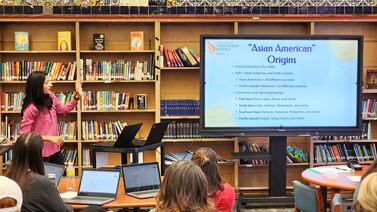Sign up for Chalkbeat Colorado’s free daily newsletter to keep up with education news in Denver and around the state.
The Denver school board paid board Vice President Auon’tai Anderson a $3,500 settlement in March, according to school district records.
Anderson said the payment represents reimbursement for legal expenses he incurred during a 2021 sexual misconduct investigation, in which the most serious allegations were not substantiated. Yet the board president said the board never voted on the payment.
The district declined to release details of the settlement, despite Colorado court rulings that say settlement agreements by political entities are subject to public records law.
The $3,500 payment to Anderson appears as a line item on a spreadsheet of board expenses posted publicly earlier this month. The spreadsheet contains little information to explain the payment. It says only, “Settlement Payment per agreement 10/10/22.”
On Wednesday, Denver Public Schools denied an open records request by Chalkbeat for the settlement agreement. “Details of the payment are confidential per the terms of the agreement,” a district spokesperson said in an email to Chalkbeat.
However, on Thursday, the district did release an invoice that shows a $3,500 payment in April 2021 from Anderson to the law firm Decker & Jones, which represented Anderson during the investigation.
Asked about the settlement and invoice Thursday, Anderson said in a statement that according to state law, “Board Members are eligible to receive reimbursement for Board related expenses. I was reimbursed for the out of pocket expenses I paid for representation during the ILG investigation.” ILG, or Investigations Law Group, was the firm that conducted the investigation.
Board President Xóchitl “Sochi” Gaytán said in an interview Thursday that the board never voted on the settlement agreement or the $3,500 payment to Anderson.
Gaytán said she didn’t know about either until three weeks ago, six months after records show Anderson was paid. Gaytán said she noticed the $3,500 payment on a spreadsheet of board expenses that board members discussed at a meeting on Sept. 7.
Colorado courts have repeatedly found that settlement agreements involving local and state governments are public documents, said Jeff Roberts, executive director of the Colorado Freedom of Information Coalition. The state attorney general’s office has said the same.
“Why is this secret and why would they be keeping it secret?” Roberts said. “There’s so many questions about why the district would pay a school board member a settlement.”
Anderson is the board’s most high-profile member. He has experienced some turmoil since he was elected in 2019, including the unsubstantiated allegations in 2021.
The investigation, which was commissioned by the board, did find that Anderson had flirtatious contact with a 16-year-old student on social media, and that he made two intimidating social media posts during the investigation. The board censured Anderson for that conduct.
The $3,500 payment to Anderson was part of $101,994 in expenses attributed to the board as a whole between August 2022 and last June, records show. That total also includes $48,431 the board spent on facilitators and conflict consultants. The board has been beset by infighting and power struggles between some members for more than a year and a half.
Individual board members were paid or reimbursed another $87,923, records show, for a total of $189,917 spent by the board in that time period.
Individual board member expenses were mostly a combination of stipends paid to some eligible board members and reimbursements for some board members to attend conferences.
Melanie Asmar is a senior reporter for Chalkbeat Colorado, covering Denver Public Schools. Contact Melanie at masmar@chalkbeat.org.







